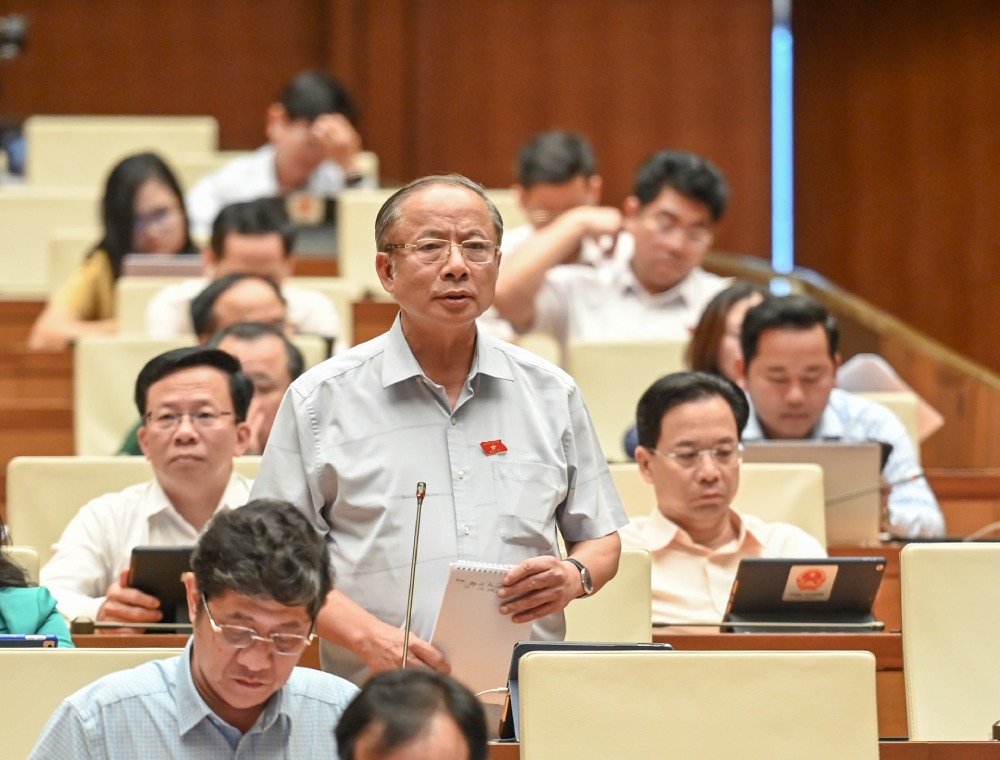On the afternoon of May 28, the National Assembly discussed in the hall the draft Resolution of the National Assembly regarding the policy of reducing value-added tax (VAT).
The majority of National Assembly deputies expressed their high agreement with the proposal to continue reducing VAT from 10% to 8% to support the economy, while emphasizing the need to perfect legal regulations and organize implementation, especially in the tax refund and policy transition stages.
Delegate Nguyen Quang Huan (Binh Duong Delegation) said that from the perspective of businesses and people, VAT reduction is very good, but from the perspective of State management, VAT reduction can reduce the State budget revenue by more than 40,000 billion VND.
The delegate suggested that the Minister of Finance consider the situation where some state agencies and some localities use budget capital but owe VAT to enterprises. Enterprises have not been able to claim VAT for many years and have to repay the tax payment to the tax authority in that area.
According to the delegate, the tax authorities of the province owe the other province and the enterprises are in the middle. This situation is even more complicated when merging provinces and cities, old agencies are no longer there, and businesses are at risk of not being able to claim that tax.
Regarding the reason, the delegate stated that it was not due to the bottleneck of enterprises but because when developing project categories and allocating capital, the agencies did not allocate capital from VAT, they only thought about the total investment, so they did not include VAT in the capital allocation.
Therefore, when implementing projects using state capital, state agencies owe corporate taxes, but enterprises owe VAT to other state agencies.
The delegate cited that every year, there are stories, the amount is not too large but the locality does not allocate capital, the capital management boards cannot allocate money to businesses, causing the debt to last up to 7-8 years.
Therefore, the delegate suggested that the National Assembly consider reducing VAT to remove difficulties for businesses, and the drafting agency study solutions to include in the resolution to completely resolve the situation of businesses having to collect tax debts in localities.

Delegate Nguyen Van Than (Thai Binh Delegation) commented on the time for VAT reduction and the responsibility of the tax collection agency/total value added tax.
The delegate said that according to the summary of opinions, there are currently three different opinions on the time to reduce VAT. The first is to reduce by the end of 2025, which is 6 months. Second, it will be reduced to December 31, 2026 (ie 1.5 years). The third opinion is to reduce it by 2 years.
Regarding individuals, the delegate agreed to reduce until December 31, 2026. The reason is that if VAT is reduced by December 31, 2026, businesses, especially small and medium enterprises, will have a strategic orientation and decision-making based on this tax, thereby having a better effect.
The delegate also strongly suggested that the National Assembly add to the resolution the responsibility of the value-added tax collection agency and the value-added tax refund agency.
"Currently, this issue is very pressing in businesses. Because when collecting, it is very easy, but when refunding taxes, it is very difficult, said the delegate.
According to the delegate, it is necessary to be fair about responsibilities in the law. When businesses are late in paying VAT, they will be fined. Therefore, the State authorities, if they pay the tax refund late, will also have to bear the same responsibility.











